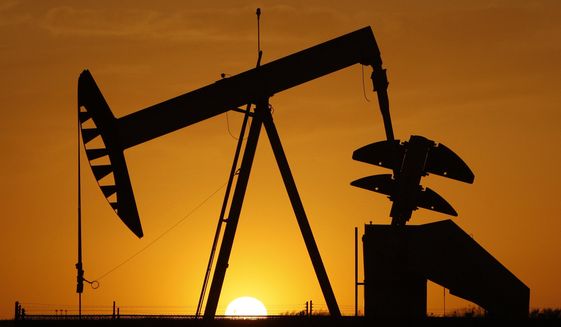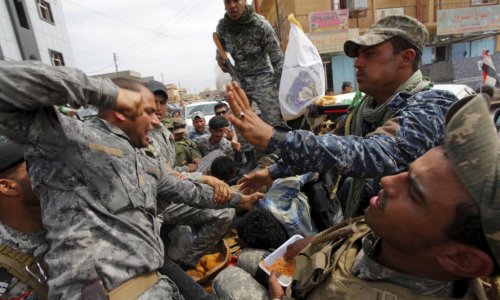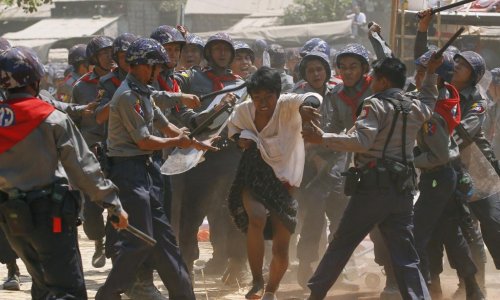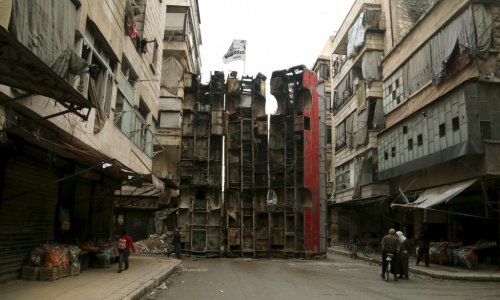It's time once again for that most hazardous exercise: guessing what the next year will bring around the world. There will be surprises, just as in 2014 the sudden rampage of ISIS, the Russian annexation of Crimea and the collapse in the crude oil price were all unforeseen. The consequences of those events, and many others besides, will leave their mark on 2015. But emerging themes may also come of age, such as the "Internet of Things" and breakthrough trade deals that galvanize the world economy.
But let's start with the bad news.
ISIS is not going away
No one is predicting a swift defeat of ISIS, the self-proclaimed Islamic State, which has proved resilient in the six months since its sudden sweep through Iraq to the fringes of Baghdad. The easy pickings are fewer, the challenge of "governing" sapping, air strikes debilitating. And a new Iraqi Prime Minister, Haider al Abadi, has begun to mend bridges with the country's Sunni minority and reorganize the army.
But ISIS is still as much on the offensive as the defensive. It appears to accept the ebb and flow of conflict, switching between holding territory and classic terror tactics. It is constantly seeking ways to stretch Iraqi forces, which are still very much a work in slow progress.
Perhaps ISIS' best hope in Iraq in coming months is that Sunnis north of Baghdad will turn to it if Shia-dominated militia persecute them. ISIS' greatest vulnerability will be the expensive and labor-intensive job of governing: providing social services, power and water, ensuring food supplies.
There are already plenty of signs -- in Iraq's second city Mosul especially -- that ISIS is failing on most of these counts.
At some point in 2015, Iraqi security forces will look to retake Mosul, but predictions of a New Year offensive seem optimistic.
In Syria, there are signs that ISIS is looking to open up new fronts -- south of Damascus and toward the Lebanese border, either itself or by co-opting other factions. It holds territory north of Aleppo, ready to take advantage of other rebel groups being pummeled by the Assad regime.
The Syrian battlefield is very complicated, with alliances coming and going in a country of dozens of factions that spend as much time fighting each other as they do Bashar Assad. Military victory for the government or its opponents is as unlikely in 2015 as it was in 2014 or 2013. Joshua Landis, a longtime Syria watcher at the University of Oklahoma, says "The Somalia-izaton of the country is inevitable so long as the international community degrades all centers of power in Syria and the opposition fails to unite."
Only a political settlement will end the bloodshed -- as was the case in Lebanon and Bosnia in decades past. But that too appears remote, despite Russia taking on the mantle of mediator. The strongest factions include ISIS and the al Qaeda affiliate al Nusra -- while moderate groups favored by the international community have lost ground.
Even so, waging war for three years has taken its toll on the regime. Aron Lund in Syria Comment expects "the regime's fraying base: finances, infrastructure, and perhaps manpower" to become a critical factor in the coming year, noting its difficulty in fielding enough capable troops. And the regime's main allies, Iran and Russia, are among the countries hit by lower oil prices (of which more later).
The three million Syrians who have become refugees face another year in tents and shelters, with two-thirds of the children receiving little or no schooling, according to UNICEF.
Arab world in turmoil
Iraqi Foreign Minister Ibrahim al Jaafari recently compared the rise of ISIS with the Thirty Years War that tore apart much of Europe in the 17th century. It's difficult to argue with him as fifty shades of jihadism spread across the Arab world -- from Benghazi in Libya to Sanaa in Yemen.
Four of the region's largest countries are in the throes of civil war. The situation in Libya has deteriorated throughout 2014: now a chaotic mix of tribal and jihadist groups fight for territory and oil while a parliament evicted from Tripoli stands powerless on the sidelines. Oil production is less than a quarter of the level four years ago.
Expect the situation in Libya to get still worse in 2015, with the absence of state authority also encouraging bigger flows of illegal migrants from sub-Saharan Africa to the Mediterranean. Libya's chaos is likely to spill over, affecting weak neighbors like Niger, and the presence of jihadist camps in the desert may invite Egyptian military action.
U.S. President Barack Obama recognized the long-term problems in the Arab world, and America's limited ability to intervene, in his year-end National Public Radio interview. "When it comes to what is going to be a generational project in a place like Libya or a place like Syria or a place like Iraq, we can help, but we can't do it for them," he said.
Obama made it clear that in the last 24 months of his presidency that he would not be rushed into nation-rebuilding in the Middle East or anywhere else, saying the pundits in Washington "think you can just move chess pieces around the table. And whenever we have that kind of hubris, we tend to get burned."
Iran: a deal?
Obama also spoke of "strategic patience" -- which is very much on show in Washington's gradual reaching-out to Tehran. A common enemy -- ISIS -- has led to a tacit understanding between the United States and Iran. Whether that opens the window to a broader relationship -- and whether negotiations on Iran's nuclear program will succeed -- is one of the big questions of 2015.
Deadlines for agreement on limiting Iran's nuclear program have come and gone: the next is July. The Obama administration has invested heavily in seeking a deal since President Hassan Rouhani's election in 2013, and Rouhani is keen to show the Iranian people he can end their economic and political isolation. Obama, in his year-end interview with NPR, said he believed "there are elements inside of Iran that recognize the opportunity and want to take it."
Hardliners in Iran may see such an opening as undermining their influence and opening the door to all sorts of Western influences. The momentum appears to be flowing against them, but the gaps between Tehran and the international community remain formidable. Perhaps the best to be expected is an interim deal that further eases sanctions.
Afghanistan: A new beginning
It seemed like "Happy Christmas: War is Over" in Kabul as the International Security Assistance Force this week lowered the flag and ended combat missions. The Taliban marked the ceremony by mocking the West for wasting billions of dollars and hundreds of lives.
Training and assistance to the Afghan military will continue, with some 13,000 troops -- most of them American -- staying on under Operation Resolute Support. Some will conduct anti-terrorism operations, but are unlikely to be enough to stave off the Taliban's resurgence in southern provinces.
We will also find out whether Hamid Karzai's successor as Afghan President, Ashraf Ghani, can improve the regional dynamics. Ironically, one of the worst tragedies of 2014 -- the Pakistan Taliban attack on a school in Peshawar -- may help him.
For years, Pakistan and Afghanistan have traded accusations (and occasionally gunfire) alleging the other supports terrorist groups. While the Afghan Taliban use Pakistani soil as a rear base, so the Pakistani Taliban slip into Afghanistan to avoid the military and to resupply.
The day after the school atrocity, a senior Pakistani military official flew to Kabul to meet Ghani. Pakistan clearly wants action against the masterminds of the attack, at least one of whom was purportedly in Afghanistan. Ghani will want a quid pro quo, which Pakistan may be reluctant to provide. It has always seen the Afghan Taliban and associated groups like the Haqqani Network as a tool against Indian influence in Afghanistan. But the two governments already are stepping up border cooperation.
It's rare that one event changes the direction of a region, but there does appear to be a rare window of opportunity for a more concerted campaign against terrorism. The history of the region suggests it may not stay open long. And the rugged territory of the region favors the insurgents.
A tax cut thanks to oil
By most forecasts, the world will be heavily reliant on the United States and China to drive growth this year. Goldman Sachs forecasts U.S. growth of 3% and China's at 7%, while much of Europe scrapes into positive territory.
The numbers may be improved by the suddenly lower price of oil. The International Monetary Fund says the sharp fall in the price of crude (down more than 40% since the summer) should add nearly 1% to global growth. Many (though not all) analysts expect the price to recover slightly, but only a catastrophe on the production side would see the price back above $100 a barrel.
For Europe, the United States and China, a lower oil price is good news. It's essentially a tax cut for consumers. The Economist estimates that the average U.S. motorist could save $800. But economies heavily reliant on oil revenues -- Nigeria, Russia and Venezuela for example -- will suffer. So may heavily indebted oil companies. For every $1 drop in the price of crude, Venezuela is estimated to lose some $700 million in revenue, making it difficult to service debt and fund basic imports.
Stagnant global demand and the rise in U.S. shale oil production are two reasons for the fall in crude prices. Saudi Arabia's decision not to cut its production is another; some oil analysts believe the Saudis are trying to retain their market share and make "nonconventional" sources such as shale less viable. Look out for bankruptcies among smaller shale producers.
But for Russia another problem
One of the safest predictions for 2015 is that Russians will have a tough year. Besides the sliding oil price, high interest rates to defend a vulnerable ruble, a shrinking economy and financial sanctions (slapped on Moscow by the United States and Europe because of Ukraine) are a toxic combination. The unanswerable question is how President Vladimir Putin will respond. Will he double down, seeking closer ties with China, India and the rest of Asia and causing mischief in the Baltics? Or will the Kremlin see the destabilization of Ukraine as not worth the candle?
Jeffrey Tayler in Foreign Policy asks whether "needing to distract his people from ever direr economic straits, [Putin] could foment separatist sentiment in, say, the majority-Russian Estonian town of Narva."
Putin certainly sees an historic struggle under way. He told the Duma in December that "the policy of containment [by Western powers] was not invented yesterday. It has been carried out against our country for many years, always, for decades, if not centuries."
To Moscow, Ukraine's bid for NATO membership is the latest iteration of that policy.
But Russia's -- and Ukraine's -- weakness may also provide scope for a deal. Ukraine satisfies few of the conditions for NATO membership and is unlikely to for years. What if Obama and German Chancellor Angela Merkel dangled guarantees that the Alliance will keep Ukraine at arm's length and gradually eliminate sanctions in return for an end to the Russian-sponsored rebellion in eastern Ukraine?
(CNN)
ANN.Az
Follow us !











